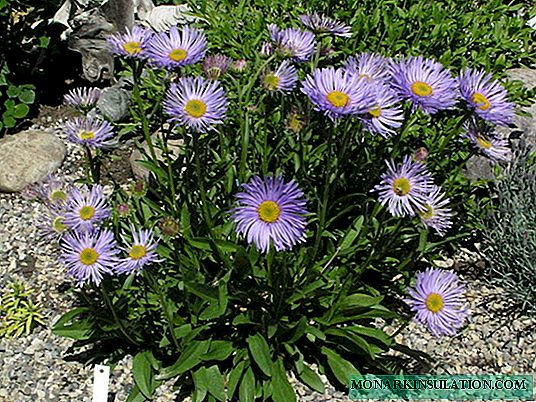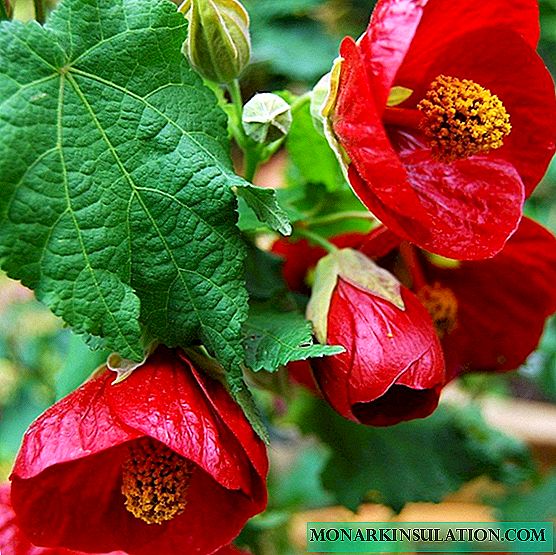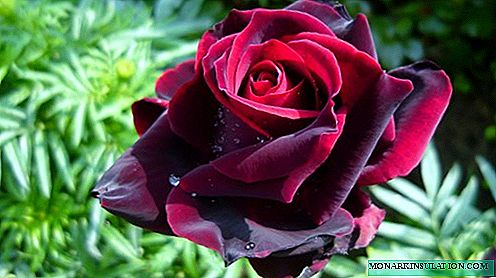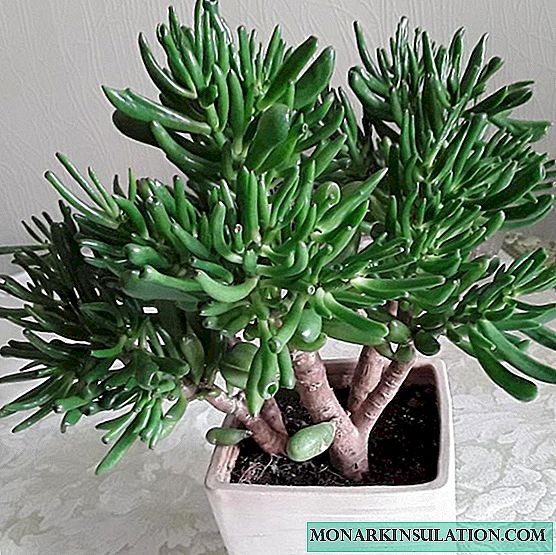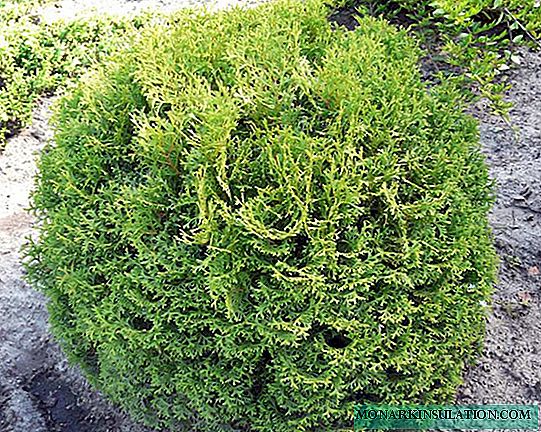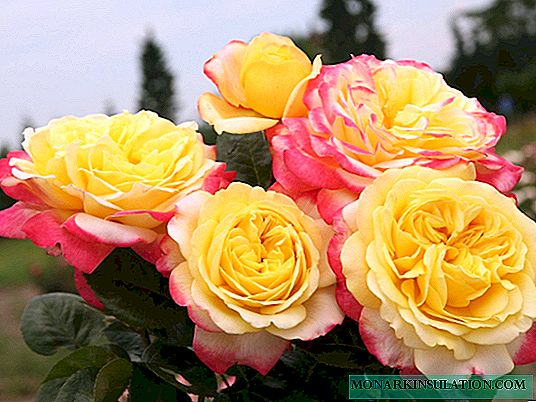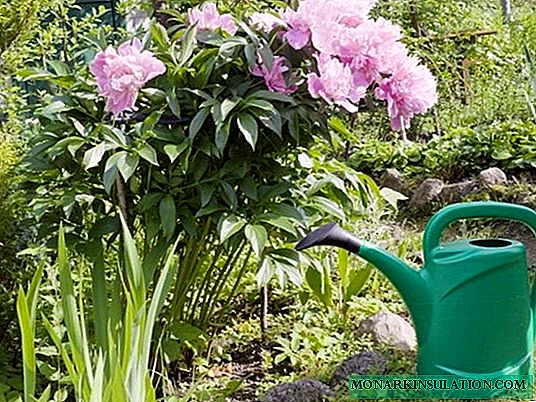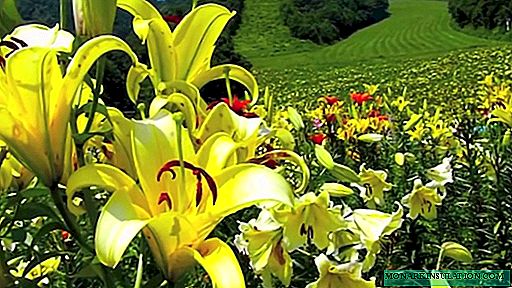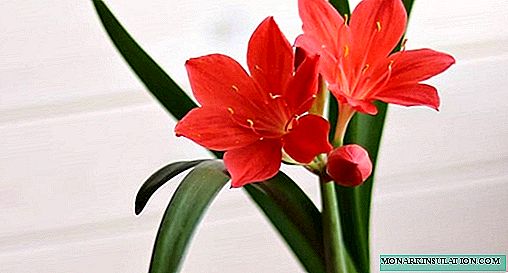Wild rose - a plant characterized by a simple form of flowers, bright and varied colors. The culture has original fruits and lush bushes.
Wild rose - what kind of flower
The second and most common name for the flower is rose hip. In total there are more than 75 species of this shrub. The plant belongs to the family Rosaceae. Almost all types of wild rose are found in all regions of the country.
Interesting! You can determine the time by a wild rose, as its flowers open and close at a specific time.

Rosehip berries
Description of what it looks like
Description of wild rose:
- life form - bush;
- the stems are most often green, covered with many small spikes;
- the flowering period lasts from the second half of May and ends in mid-summer;
- the fruits ripen in September;
- a simple flower with many stamens;
- the color depends on the variety (from white to bright pink);
- the color of the fruit is also varied.
Self-pollination of a flower is rare, more often it requires the involvement of pollinating insects, which willingly flock to a pleasant, bright flower aroma.
Healing properties, application in the household
The fruits of the plant have medicinal properties and help with colds, coughs, bronchitis. They are simply added to tea, brewed as a tea drink, boiled compote from fruits to strengthen immunity. The berries of the plant contain a huge amount of vitamin C.
Varieties of wild roses for growing in the garden
Wild rose bushes are often grown to improve the appearance of courtyards, parks, grown as hedges and in garden plots. Especially the plant is suitable for too busy gardeners who want their garden to look as attractive as possible with a minimum of effort.
Dog Rose (Canina)
The most common type of shrub that is used to create live fences. Large fragrant flowers of bright pink color bloom in early summer, and ripening of berries begins closer to autumn. The maximum height of the bush is 3 m. The plant is very unpretentious, practically requires no maintenance.
French (Gallica)
French rosehip grows only in the southern parts of Russia and European countries. The bush is stunted, the height of the stems does not even reach 1 m. The flowers are bright red. It can be grown as a houseplant.
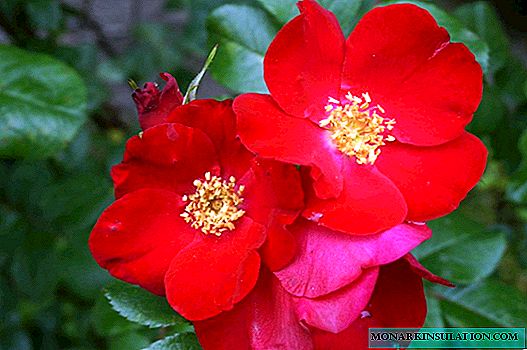
French Rose Hips
Devil's Rose Lacorn
This undersized plant has no thorns on thin long stems. Peduncles are long, large bright flowers are located on them. Fruits and pedicels have small sticky droplets that give Lacorn an original look.
Wild Moyes Rose
The Moyes rose species includes several decorative flowers with large bottle fruits and bright red flowers. The leaves are bright green; against their background, the flowers look especially impressive.
Wild rose Altay
The variety of marshmallows is a perennial herbaceous shrub reaching 2 m in height. The root system is very powerful, there are no thorns, instead of them the stems and petioles of the leaves are covered with villi. The flowers are large, white-pinkish in color, located on short peduncles.

Variety Altay
Rust rose
This plant has the appearance of a shrub about 1.5 m high, but can grow up to 2.5 m. The stems are covered with large spikes. Leaves are green, up to 12 cm, with seven leaves. The flowers are pale pink. Fruits are red, spherical in shape.
Rosa Hugonis and others
This is a wild yellow rose that blooms first among the varieties. The flowers are pale yellow, located on short pedicels throughout the shoot. The bush has many thorns and is highly immune. It grows very quickly, grows to 2.5 m.

Rosa Hugonis
In addition to the above, flower growers also grow other varieties of rose hips. Often there is a white wild rose and cinnamon rosehip.
Growing a wild rose, how to plant in open ground
Growing a wild rose and planting it does not cause a gardener much trouble. This is a fairly unpretentious plant.
What time is the landing
You can plant young plants at any time. The optimal period for planting in open ground is early spring, when young shoots gave a small increase.
Location selection
Any arrangement is suitable for rose hips, but it will not last long on shaded areas, and the fruits may not form at all. The bush is growing rapidly. It is worthwhile to preallocate a wide area in advance, since it will be problematic to transplant the plant to a new place.
How to prepare the soil and flower for planting
The soil should be fertilized and a landing pit prepared. The roots of the seedling are treated with a solution of potassium permanganate. They need to be inspected and all damaged parts removed. The main roots are shortened by a few centimeters.
Landing procedure step by step
- For each plant, prepare a hole 50x50x50 cm.
- Add 10-15 kg of compost, 200 g of superphosphate, a little potassium chloride and ammonium nitrate to the pits.
- Top bushes trimmed to 15 cm.
- 10 l of soft water at room temperature are poured into each hole.
- Prepared seedlings are put in the hole and sprinkled with earth. The top layer should be slightly higher than the level at which the bush was recessed in the landing container (about 5 cm).
- Then the rosehip is watered, a little tamped soil and mulch sawdust, peat or moss.

Rosehip planting in open ground
Plant care
Wild rose does not require additional care. This is an option for beginner gardeners, and for those who do not have much time to work in the garden.
Watering rules and humidity
Rosehip can adapt even to hot, dry weather. During a period of particular drought, you can water it. At the same time, 10-15 liters of water are poured under each bush, not more. During the season, do not water a wild rose more than 3 times.
Top dressing and soil quality
A flower needs feeding only in the first years of life, it needs both mineral and organic fertilizers. The main thing is not to overdo it with nitrogen, otherwise problems with flowering may begin.
Pruning and transplanting
The first cardinal pruning is done after planting, if the shoots were not shortened initially. Then only formative pruning is required, which is carried out once every 3 years.
Features of wintering a flower
Winters, even severe ones, endure most types of rose hips calmly. It is better to cover the gentle southern variety of the bush with a special protective material.
Flowering roses
The bush blooms, as a rule, actively and for quite a long time.
Period of activity and rest
The period of activity begins in April, when the buds are laid. Wild rose blooms in mid-July.
Care during and after flowering
The rules for leaving during this period remain the same as in the rest of the time. No extra effort required.
What to do if it does not bloom, possible causes
Rosehip begins to bloom the next year after planting, so in the first year of life you should not wait for flowering. The reasons for the lack of flowering may be too strong shading of the bush or an excess of nitrogen in the soil.
Flower propagation, methods
The main methods of propagation of a flower:
- by seeds;
- cuttings;
- layering;
- dividing the bush;
- division of the rhizome.
When produced
The breeding time is spring.
Diseases, pests and ways to combat them
Rosehip is almost not susceptible to attack by pests or diseases. If this happens, you will need to use chemicals, insecticides. At the initial stages of the defeat by insect pests, folk recipes, for example, a solution of garlic or iodine, help.
A wild rose is a flower that adorns not only forest slopes, courtyards or parks, but also flower beds of gardeners who want to choose for themselves something simple, beautiful and useful. The bush creates beauty in any garden plot where it is located. It’s not at all difficult to take care of a dog rose. Growing, he looks unusual, representing a whole thicket.

